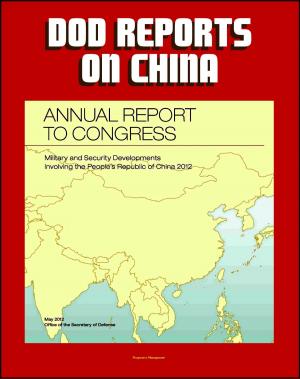National Defense Intelligence College Paper: Bringing Intelligence About - Practitioners Reflect on Best Practices - CIA Analysis, Analytical Tradecraft, Process Management
Nonfiction, Social & Cultural Studies, Political Science| Author: | Progressive Management | ISBN: | 9781311771469 |
| Publisher: | Progressive Management | Publication: | February 5, 2014 |
| Imprint: | Smashwords Edition | Language: | English |
| Author: | Progressive Management |
| ISBN: | 9781311771469 |
| Publisher: | Progressive Management |
| Publication: | February 5, 2014 |
| Imprint: | Smashwords Edition |
| Language: | English |
This unique and informative paper was produced by the National Intelligence University / National Defense Intelligence College. Topics and subjects include: CIA analysis, internet and electronic media, analytical tradecraft, process management, U.S. Coast Guard, DIA, DODIIS, COLISEUM, JWICS, SIPRNET, OSIS, DITDS, HUGIN expert, ESRI, induction, deduction, and abduction.
The title chosen for this book carries two meanings. The more straightforward interpretation of "Bringing Intelligence About,'' and the principal one, refers to the book's coverage of wide-ranging sources and methods employed to add value to national security-related information—to create "intelligence.'' A second meaning, not unrelated to the first, refers to the responsible agility expected of U.S. intelligence professionals, to think and act in such a way as to navigate information collection and interpretation duties with a fix on society's shifting but consensual interpretation of the U.S. Constitution. A prominent individual and ideal intelligence professional who lived both meanings of "Bringing Intelligence About'' was the late Lieutenant General Vernon A. Walters. As an intelligence officer, defense attache, ambassador-at-large and ambassador to Germany, his combination of skills—notably his language skills—made him the epitome of a professional. Beyond intelligence service in the Departments of Defense and of State, General Walters presided as Deputy Director of Central Intelligence during the Watergate episode, where he stood on principle and at odds with political figures in the Nixon administration. His mastery of intelligence collection, analysis and politically attuned synthesis, the full story of which has not yet been told, make him a near-mythic figure for aspiring intelligence professionals. Although the talents and assignments of General Walters were extraordinary, his demonstration that intelligence aptitudes and skills are fungible across Departments and Agencies is a powerful suggestion that those separate institutions can also operate together as a professional community.
This volume helps us move down the long and difficult road of helping identify how to produce good or better intelligence—by which I mean intelligence that is of use to policymakers and is better than other intelligence by being so used. The authors have—across a range of areas of interest—identified some of the practices that work best to produce—or, more aptly, "to bring about"—good intelligence. Note that the preceding sentence said "some of the practices." Few books could expect to identify all of the practices that work and, as the authors of each chapter would undoubtedly concede, there will always be some variables and intangibles at work in intelligence: vagaries of time to perform collection and analysis; the quality of sources; the quality of the analysts; the nature and personality of the policymakers. Still, it is possible to identify the practices that work and the practices that have to be altered over time as conditions change.
This unique and informative paper was produced by the National Intelligence University / National Defense Intelligence College. Topics and subjects include: CIA analysis, internet and electronic media, analytical tradecraft, process management, U.S. Coast Guard, DIA, DODIIS, COLISEUM, JWICS, SIPRNET, OSIS, DITDS, HUGIN expert, ESRI, induction, deduction, and abduction.
The title chosen for this book carries two meanings. The more straightforward interpretation of "Bringing Intelligence About,'' and the principal one, refers to the book's coverage of wide-ranging sources and methods employed to add value to national security-related information—to create "intelligence.'' A second meaning, not unrelated to the first, refers to the responsible agility expected of U.S. intelligence professionals, to think and act in such a way as to navigate information collection and interpretation duties with a fix on society's shifting but consensual interpretation of the U.S. Constitution. A prominent individual and ideal intelligence professional who lived both meanings of "Bringing Intelligence About'' was the late Lieutenant General Vernon A. Walters. As an intelligence officer, defense attache, ambassador-at-large and ambassador to Germany, his combination of skills—notably his language skills—made him the epitome of a professional. Beyond intelligence service in the Departments of Defense and of State, General Walters presided as Deputy Director of Central Intelligence during the Watergate episode, where he stood on principle and at odds with political figures in the Nixon administration. His mastery of intelligence collection, analysis and politically attuned synthesis, the full story of which has not yet been told, make him a near-mythic figure for aspiring intelligence professionals. Although the talents and assignments of General Walters were extraordinary, his demonstration that intelligence aptitudes and skills are fungible across Departments and Agencies is a powerful suggestion that those separate institutions can also operate together as a professional community.
This volume helps us move down the long and difficult road of helping identify how to produce good or better intelligence—by which I mean intelligence that is of use to policymakers and is better than other intelligence by being so used. The authors have—across a range of areas of interest—identified some of the practices that work best to produce—or, more aptly, "to bring about"—good intelligence. Note that the preceding sentence said "some of the practices." Few books could expect to identify all of the practices that work and, as the authors of each chapter would undoubtedly concede, there will always be some variables and intangibles at work in intelligence: vagaries of time to perform collection and analysis; the quality of sources; the quality of the analysts; the nature and personality of the policymakers. Still, it is possible to identify the practices that work and the practices that have to be altered over time as conditions change.















